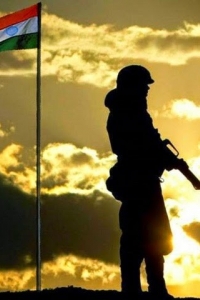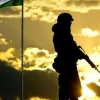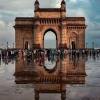
Major Suryashekhar Bose, or ‘Sirius’ as he was called by fellow comrades, paced up and down across the barricades set up by his unit, his boots clanking on the empty road’s pavement. A couple of tyre heaps slowly smoldered some distance ahead, the black smoke from them creating a screen amid downed shop shutters and upturned vendor carts. Burnt scooters, fruits, and shards of glass were strewn about. Violent riots had broken out ostensibly on religious lines and the administration, after 3 days of dithering (or as some people opined, after 3 days of deliberately waiting and watching) had called the Army in. Many people on both sides had already been murdered, and countless had been injured and/or rendered homeless. Sirius’ unit had just completed conducting a flag march through one of the restive neighbourhood (Sirius remembered curious faces peeping out of windows to take a look at the marching columns with looks that varied from anxiety, hope, fear, and relief) and had now set up a barrier at a strategic location. There was an uneasy calm for now, but Sirius felt queasy somewhere in his head.
The Armed Forces hadn’t been a natural career choice for Sirius. He came from a typical Bengali middle-class family of Tagore-loving tea-swigging office goers and over-anxious super-caring homemakers. He wasn’t an athlete in any sense but was a sharp lad who scored reasonably well at school and played reasonably good football. But the Mumbai attacks lit a flame somewhere in his head, and soon the NDA gates welcomed him in. He passed out with the Lachit Borphukan Gold Medal on his chest and was inducted into the Dogra Regiment at Faizabad (Little did he know that the proximity to Ayodhya would manifest itself in other forms later in his life). He proved to be a tough soldier and a jovial leader and earned his nickname in due course of time. After a grueling and life-changing stint at Siachen, Sirius underwent the bone-crunching Jungle Warfare course at Vairengte. Soon enough, he was back in (where else) Kashmir; this time as an officer of the 20 Rashtriya Rifles Battalion.
With the 20RR, Sirius was part of numerous operations that severely tested his personal beliefs and humanitarian principles. He realized there were good people and bad people on both sides of the conflict, and that the term “side” itself was an enigma in this land. He worked with Para SF units, the Marcos, the JK Police, and even with the IB; and went to places and saw things even he didn’t want to revisit in his head, leave alone speaking about it with someone else. He, and indeed most of his comrades, went through the entire spectrum of recognition: from being hugged and garlanded as saviours to being shooed away & stoned at like unwanted intruders, and everything in between. Martyrdom had been thrust upon many of his comrades along the way, and while each one of them cherished the privilege, they surely didn’t go about seeking it. He had also been once called back from J&K to be part of the flood rescue mission in Kerala, and knew that the Indian Army was the administration’s panacea – flood or riot, avalanche or bridge collapse; when all else failed, the jawans were the only hope.
But there was this other thing Surya had learnt over the years, and it was this that was making him queasy behind the barricades now. The realization was how the quest for money and power had dragged entire humankind to the very edge of darkness. There were simply just two sides to every goddamned conflict in the world; the haves and the have-nots. The quest of the haves is to protect their territory, and the struggle of the have-nots is to either dislodge the haves or to become a part of them. The judgment of who is good and who is bad is then done through the lens of who is making the judgement and for whom. And then everything is fair strategy – race, religion, geography, gender, age, profession… anything. And in the end, if you happen to remain on the have-not side, then you, my friend are expendable. You are the guinea pig for the next political, corporate, or ‘human’ experiment.
Surya struggled to evaluate his role in such a society. He had been trained for years to be an unquestioning agent for implementing the policy of the land’s sovereign power (“A soldier fights where he is told and wins where he fights” was one of the credos that defined his ilk). But too many times, he had realized that the ones caught in his crosshairs were just unprivileged individuals caught in the quagmire of vested interests. And that is what the whole of humanity seemed to be coming to. He, and indeed his comrades at large, had discharged their duties with utmost empathy and compassion, but there are limits to just how empathetic and compassionate a soldier is allowed to be. Of course, kindness and humanity in the traditional sense still existed in the world, and indeed that was what was preventing the world from imploding into outright destruction. But was it strong and persistent enough? Surya wasn’t sure anymore.
Sirius’ unit had now brought things under control. For now. Sirius was relieved but knew it was just another episode of a long-running soap opera. In some time, the shops would open again. People will pick themselves up and trudge to work. Schools will reopen and the factories will again come to life. But the scars will remain. Till Sirius needs to be summoned again.
This story has not been moderated or edited by the Readomania Team.
About the Author






Comments